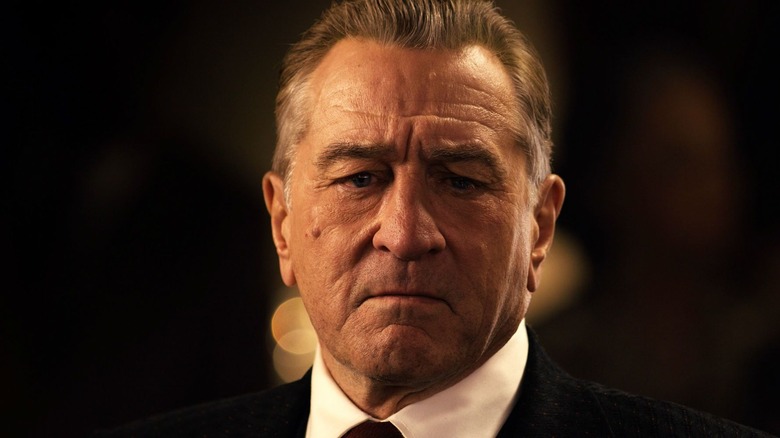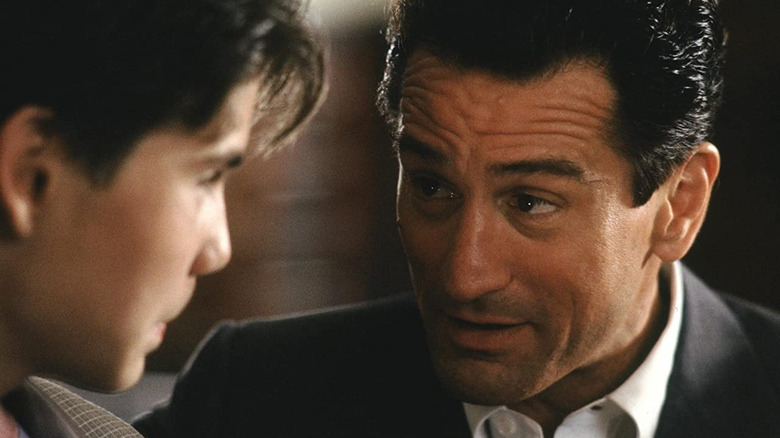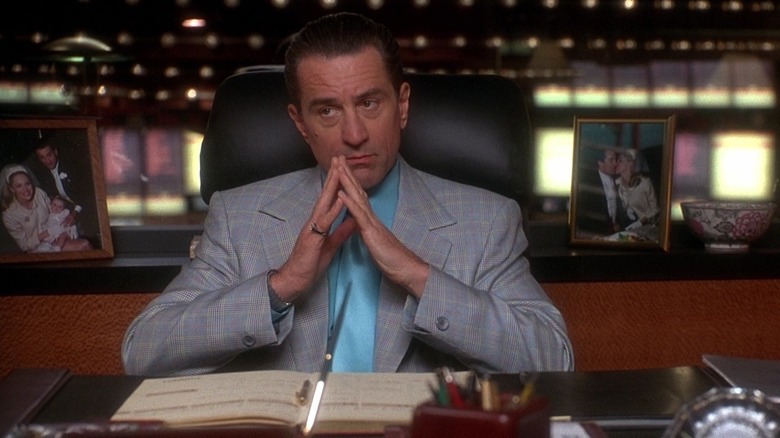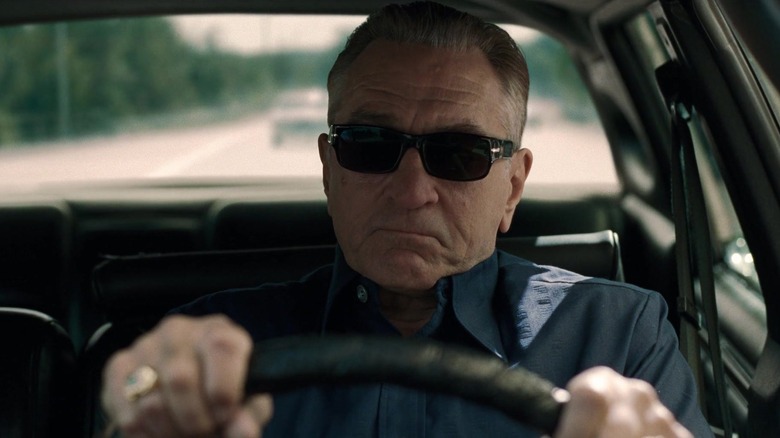Robert De Niro Wasn't Interested In Making The Departed Or Gangs Of New York
Whether you view him as the patron saint of filmmaking or politely respect the man and his contributions to cinema without worshipping him at the shrine, there's no denying that Martin Scorsese's new film, "Killers of the Flower Moon," is a pretty momentous occasion. It's the first time the director has collaborated with both of his muses, Robert De Niro and Leonardo DiCaprio, on a feature-length project, having previously teamed up with them on his 2015 meta-comedy short "The Audition." But why did it take so long?
It wasn't for lack of trying. By the time Scorsese had begun his run with DiCaprio in the early 2000s (which is now six films deep), De Niro had entered what you could dub his comedy phase. Starting with Harold Ramis' 1999 comedy "Analyze This," a movie in which De Niro knowingly sends up his mobster personas in Scorsese's "Goodfellas" and "Casino," the actor spent much of the next two decades appearing in a series of broad farces, ranging from kid-friendly ("Shark Tale") to decidedly not ("Dirty Grandpa"). Save for occasional dramatic interludes like "The Good Shepherd," which he also directed, De Niro is basically the funny old guy who makes stuff like "Meet the Parents" to those who were raised on his films from our current century.
Whether that's a good thing or not, I leave it between you and your god, but things might've gone differently had De Niro starred opposite DiCaprio in Scorsese's 2006 Best Picture winner "The Departed." Scorsese confirmed to Deadline that he spoke to De Niro about the film, "but he didn't want to do it." What's more, something similar had happened just a few years earlier, when De Niro passed on DiCaprio's first movie with Scorsese, "Gangs of New York."
Finding the right fit
As Martin Scorsese explained, it's not that he and Robert De Niro have ever stopped looking for new movies to collaborate on. It's always been about finding the right fit at the right time:
"Look, there are some people I work with a lot because I find that I'm ... in the margins, in a way. I look back, and I feel lucky enough to have gotten the films made that I got made. By 'in the margins,' I mean it in the sense that there are many actors over the years I would've loved to work with, but ... I don't fit in with the industry thinking."
It's funny to think of living legend Martin Scorsese as being "in the margins," but I understand his meaning. Save for his movies with Leonardo DiCaprio, Scorsese has only directed a handful of proper financial hits — and even when it comes to DiCaprio, their films tend to defy standard Hollywood wisdom about what constitutes a surefire bet. (Nobody looks at "Shutter Island" and sees a crowd-pleaser, in other words.) Scorsese cited this as a big part of the reason he and De Niro didn't work together between making "The King of Comedy" in 1983 and then "Goodfellas" in 1990.
"Then we made another two, three films. And then, for another 19 years, we didn't," Scorsese observed. Still, because his and De Niro's creative visions tend to align on projects dealing with challenging subject matter, Scorsese was always confident they would eventually reunite:
"There seemed to be a comfort level [with Bob and I], not easy by the way at all, but a comfort level in knowing we could get to a place. What that place is, I may not be able to verbalize, but together we could probably find something."
'Nah, I don't wanna do that'
After "Casino," Martin Scorsese said Robert De Niro asked him to direct "Analyze This," to which Scorsese replied, "We already did it. It was 'Goodfellas.'" The two movies are obviously worlds apart in terms of their tone and style, but again, one can grasp Scorsese's meaning: Both films examine violence, machismo, and the toll of being a gangster (from the psychological effects to the impact on those around them). We can also safely assume Scorsese would've approached "Analyze This" very differently from Harold Ramis.
As Scorsese recalled:
"I talked to [De Niro] about other projects, and at one point he said, 'You know the kind of stuff I like to do with you.' I said, 'OK.' That became 'The Irishman,' and it took nine years. We were always looking. 'What about 'The Departed?” 'Nah, I don't wanna do that.' 'OK.'"
On the topic of De Niro passing on "Gangs of New York," Scorsese said, "That was just a check-in. Literally, he said, 'What are you doing?' 'I'm doing this. You interested?' 'Nah.' 'OK.'" It's long been reported that De Niro was up to play William "Bill the Butcher" Cutting in the film, prior to Daniel Day-Lewis being cast. Perhaps De Niro simply wasn't interested in playing yet another violent high-ranking gangster after "Goodfellas," "Casino," and the various movies in which he had riffed on his mobster boss image for comedic effect (including the "Analyze This" sequel, "Analyze That," and again later in "The Family").
De Niro was similarly eyed to play Martin Sheen's eventual role as the paternal police captain Oliver "Charlie" Queenan in "The Departed," but reportedly had to pass due to a scheduling conflict with "The Good Shepherd." Based on this new quote from Scorsese, it seems a general lack of interest might've also been a factor in his decision.
The continuing adventures of Bob and Marty
Martin Scorsese cited his and Robert De Niro's shared New York upbringing as teenagers as another reason the pair have always made for natural collaborators — and, as such, why they've always circled back to one another:
"He knows that part of New York. It was all instinct between us and his courage and his humility, in terms of how he'll say, 'If a scene plays on my back, fine, but if it plays better on the other person's face, play that.'"
By the time they finally reunited for "The Irishman," Scorsese said De Niro both had and hadn't changed from the artist he once knew:
"Now, that was a certain period of time. Does he still think that way, 10 years later? Turns out he did! But is he the old Bob? No. You've got to see where they are."
So what set "The Irishman" apart from the numerous Scorsese-directed mobster and crime flicks that De Niro had previously turned down? If I were to venture a guess, I would say it's that the story of real-life hitman Frank "The Irishman" Sheeran offered De Niro a chance to portray a very different type of gangster — a working-class type who never fancies himself being more than a hired hand, but one who nevertheless pays a significant price for a lifetime of violence and moral compromises. He's unlike any character De Niro had previously played for Scorsese, and the film itself is the perfect capstone to the pair's run of mobster movies.
As for De Niro's "Killers of the Flower Moon" character? He's a whole other beast, but you'll just have to watch the movie to see what I mean. It premieres in select theaters on October 6, 2023, before going wide two weeks later.



